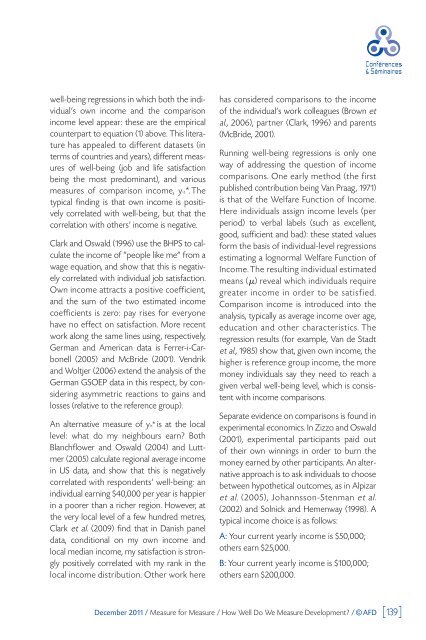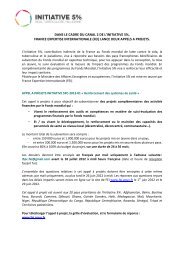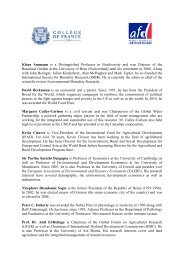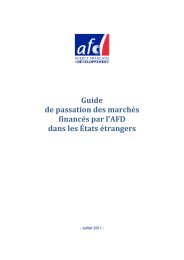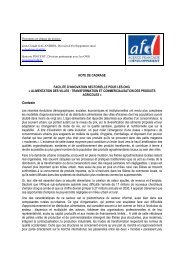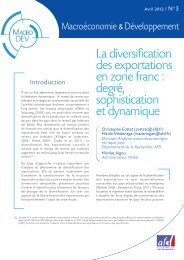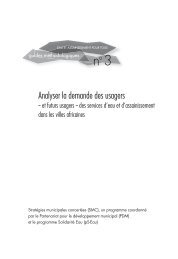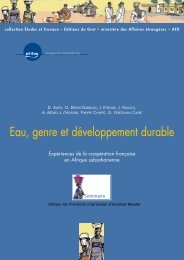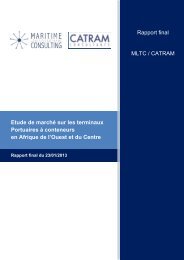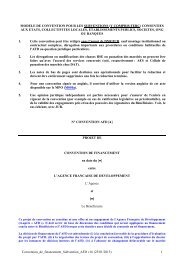Paris School of Economics - L'Agence Française de Développement
Paris School of Economics - L'Agence Française de Développement
Paris School of Economics - L'Agence Française de Développement
Create successful ePaper yourself
Turn your PDF publications into a flip-book with our unique Google optimized e-Paper software.
well-being regressions in which both the individual’s<br />
own income and the comparison<br />
income level appear: these are the empirical<br />
counterpart to equation (1) above. This literature<br />
has appealed to different datasets (in<br />
terms <strong>of</strong> countries and years), different measures<br />
<strong>of</strong> well-being (job and life satisfaction<br />
being the most predominant), and various<br />
measures <strong>of</strong> comparison income, yit*. The<br />
typical finding is that own income is positively<br />
correlated with well-being, but that the<br />
correlation with others’ income is negative.<br />
Clark and Oswald (1996) use the BHPS to calculate<br />
the income <strong>of</strong> “people like me” from a<br />
wage equation, and show that this is negatively<br />
correlated with individual job satisfaction.<br />
Own income attracts a positive coefficient,<br />
and the sum <strong>of</strong> the two estimated income<br />
coefficients is zero: pay rises for everyone<br />
have no effect on satisfaction. More recent<br />
work along the same lines using, respectively,<br />
German and American data is Ferrer-i-Carbonell<br />
(2005) and McBri<strong>de</strong> (2001). Vendrik<br />
and Woltjer (2006) extend the analysis <strong>of</strong> the<br />
German GSOEP data in this respect, by consi<strong>de</strong>ring<br />
asymmetric reactions to gains and<br />
losses (relative to the reference group).<br />
An alternative measure <strong>of</strong> yit* is at the local<br />
level: what do my neighbours earn? Both<br />
Blanchflower and Oswald (2004) and Luttmer<br />
(2005) calculate regional average income<br />
in US data, and show that this is negatively<br />
correlated with respon<strong>de</strong>nts’ well-being: an<br />
individual earning $40,000 per year is happier<br />
in a poorer than a richer region. However, at<br />
the very local level <strong>of</strong> a few hundred metres,<br />
Clark et al. (2009) find that in Danish panel<br />
data, conditional on my own income and<br />
local median income, my satisfaction is strongly<br />
positively correlated with my rank in the<br />
local income distribution. Other work here<br />
has consi<strong>de</strong>red comparisons to the income<br />
<strong>of</strong> the individual’s work colleagues (Brown et<br />
al., 2006), partner (Clark, 1996) and parents<br />
(McBri<strong>de</strong>, 2001).<br />
Running well-being regressions is only one<br />
way <strong>of</strong> addressing the question <strong>of</strong> income<br />
comparisons. One early method (the first<br />
published contribution being Van Praag, 1971)<br />
is that <strong>of</strong> the Welfare Function <strong>of</strong> Income.<br />
Here individuals assign income levels (per<br />
period) to verbal labels (such as excellent,<br />
good, sufficient and bad): these stated values<br />
form the basis <strong>of</strong> individual-level regressions<br />
estimating a lognormal Welfare Function <strong>of</strong><br />
Income.The resulting individual estimated<br />
means (�) reveal which individuals require<br />
greater income in or<strong>de</strong>r to be satisfied.<br />
Comparison income is introduced into the<br />
analysis, typically as average income over age,<br />
education and other characteristics. The<br />
regression results (for example, Van <strong>de</strong> Stadt<br />
et al., 1985) show that, given own income, the<br />
higher is reference group income, the more<br />
money individuals say they need to reach a<br />
given verbal well-being level, which is consistent<br />
with income comparisons.<br />
Separate evi<strong>de</strong>nce on comparisons is found in<br />
experimental economics. In Zizzo and Oswald<br />
(2001), experimental participants paid out<br />
<strong>of</strong> their own winnings in or<strong>de</strong>r to burn the<br />
money earned by other participants. An alternative<br />
approach is to ask individuals to choose<br />
between hypothetical outcomes, as in Alpizar<br />
et al. (2005), Johannsson-Stenman et al.<br />
(2002) and Solnick and Hemenway (1998). A<br />
typical income choice is as follows:<br />
A: Your current yearly income is $50,000;<br />
others earn $25,000.<br />
B: Your current yearly income is $100,000;<br />
others earn $200,000.<br />
December 2011 / Measure for Measure / How Well Do We Measure Development? / © AFD [ 139]


